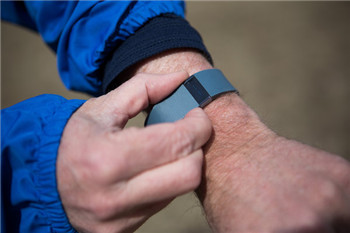(单词翻译:单击)

Wearable activity monitors can count your steps and track your movements, but they don’t, apparently, help you lose weight.
可穿戴式活动监测设备能计算你的步数,并追踪你的运动,但它们对减肥似乎没有帮助。
In fact, you might lose more weight without them.
实际上,不用它们的话,你的减肥效果可能更好。
The fascinating finding comes from a study published today in JAMA that found dieting adults who wore activity monitors for 18 months lost significantly fewer pounds over that time than those who did not.
这项非常有趣的发现来自《美国医学会杂志》(The Journal of the American Medical Association)今天发表的一项研究。该研究发现,在18个月的时间里,戴活动监测设备的成人减肥者体重下降的磅数,明显少于不戴活动监测设备的人。
The results suggest that activity monitors may not change our behavior in the way we expected, and raise interesting questions about the tangled relationships between exercise, eating, our willpower and our waistlines.
相关结果表明,活动监测设备或许并不会以我们预计的方式改变我们的行为。它们也引出了有关锻炼、饮食、意志力和腰围之间错综复杂的关系的问题,颇为有趣。在最近的一些研究中,出现了一些激动人心的迹象。
There have been tantalizing hints in a few studies recently that new technologies such as wearable activity monitors, which tell us how much we are moving and how many calories we have burned during the day, might help some people to drop pounds.
这些迹象表明,像能够告诉我们一天中做了多少运动,燃烧了多少卡路里的可穿戴式活动监测设备这样的新技术,或许有助于一些人减肥。
Those studies, however, had typically been small scale and short term, so it was still unclear how much activity monitors might aid in weight loss.
然而,这些研究往往规模小,周期短,因此活动监测设备对减肥的帮助作用可能有多大仍不得而知。
So for the new study, University of Pittsburgh scientists from the Physical Activity and Weight Management Research Center and their colleagues gathered almost 500 young, overweight men and women who wanted to lose weight.
就前文提到的新研究而言,匹兹堡大学(University of Pittsburgh)来自身体活动与体重管理研究中心(Physical Activity and Weight Management Research Center)的科学家和他们的同事招募到了近500名想减肥的超重青年男女。
The recruits ranged in age from 18 to 35 since, presumably, these younger volunteers would be familiar with and competent using technologies such as activity trackers and any learning curve would be slight.
他们的年龄在18到35岁之间,因为这些较年轻的志愿者大概会对活动追踪设备这类技术比较熟悉,能够正确使用它们,需要学习的话也会较为容易。
The volunteers were weighed and their general health and fitness assessed.
志愿者们称了体重,并接受了总体健康状况评估。
Then, for the first six months of the study, the volunteers followed a straightforward, low-calorie diet designed to provide steady weight loss and were urged to start moving more, aiming for at least 100 minutes of moderate activity each week.
然后,在研究的头六个月里,志愿者们遵循一种简单的低热量饮食计划。该计划的设计意图是实现稳定的体重下降。研究人员督促他们开始增加运动量,目标是每周至少进行100分钟的低强度活动。
They kept daily food and exercise diaries and attended weekly counseling sessions.
他们要写饮食和锻炼日记,还要参加每周一次的咨询辅导活动。
By the end of six months, everyone had lost weight.
六个月结束时,所有人的体重都下降了。
And then the actual experiment began.
然后,真正的实验开始了。
The scientists now divided their volunteers in half.
科学家们把志愿者平分成两组。
One group was told to start logging their daily exercise sessions onto a study website.
一组被要求把每天的锻炼时间记录在一个研究网站上。
The others were given a monitor designed to be worn on the upper arm that would track their physical activity and provide feedback about whether they were achieving goals for step counts, calorie expenditure and so on.
其他人则拿到了监测仪,它会被使用者戴在上臂上,以追踪用户的身体活动,并就用户是否即将完成步数和热量消耗等方面的目标提供反馈。
We were pretty confident that the volunteers in the group using the activity monitors would exercise more, monitor their calorie intake better, and lose more weight than the people in the self-monitoring group, says John Jakicic, a distinguished professor in the department of health and physical activity at the University of Pittsburgh and the study’s lead author.
匹茨堡大学健康与身体活动系的著名教授、这项研究的第一作者约翰•亚基奇科(John Jakicic)说,我们本来非常相信使用活动监测仪那个小组的志愿者会加大运动量,更好地监测热量摄入,因而减肥效果也会比自我监控小组的人好。
For 18 months, the volunteers logged into the study website or wore the monitor on most days.
在18个月里,志愿者们大部分时候或是登陆前述研究网站,或是戴着监测仪。
Counselors occasionally checked with everyone by phone and sent encouraging text messages.
咨询顾问偶尔会通过电话进行检查,并发送鼓励短信。
After 18 months — and two years after the beginning of the study — all of the volunteers returned to the lab to repeat their measurements from the start.
在18个月,也就是研究开始两年后,所有志愿者都回到实验室,重新读出他们一开始的体重。
Most were thinner now than at the start of the study (although many had regained some of the weight that they had lost during the first six months).
此时大部分人都比研究开始的时候瘦了(不过不少人在最初六个月体重下降后,又出现了一定程度的反弹)。
Those who had not worn activity monitors were, on average, about 13 pounds lighter now than two years ago.
不戴活动监测仪的人平均比两年前轻了大约13磅。
Those who had worn the monitors, however, weighed only about 8 pounds less than at the start.
而戴活动监测仪的人只比一开始瘦了大约8磅。
We were definitely surprised, Dr Jakicic says.
我们确实很惊讶,亚基奇科说。
The reasons for the difference in weight loss are not immediately clear, he says.
他表示,减肥效果出现这种差异的原因目前还不清楚。
Theoretically, those using the monitors might have been so inspired to exercise that they moved a lot, developed large appetites, and overate, blunting any weight loss from the workouts, he says.
他说,从理论上说,使用监测仪的那些人可能大受鼓舞,以至大量运动,胃口变大,吃得太多,削弱了锻炼产生的减肥效果。
But in fact, the data from the monitors shows that those wearing the technology generally exercised less than those in the other group.
但事实上,来自监测仪的数据显示,使用这种技术的人总体上比另一组的人锻炼得少。
So perhaps the monitors resulted in less motivation to move, Dr Jakicic says.
亚基奇科说,所以也许监测仪导致的结果,是锻炼的积极性降低。
It is possible, he says, that when those wearing the trackers realized they would not reach their daily exercise goal, they simply gave up, leading to relatively low caloric expenditure on those days, and less weight loss overall than among those not using the technology.
他说,可能当那些佩戴追踪设备的人意识到他们达不到每天的运动目标时就放弃了,导致那些日子里的热量消耗相对较低,总体上的减肥效果不及不使用该技术的人。
The people using the monitors may also have assumed that, in some roundabout way, the technology removed responsibility from them for monitoring their energy intake, Dr Jakicic says.
亚基奇科说,使用监测设备的人也可能认为,该技术以某种模糊的方式免去了他们自己监测能量摄入的责任。
People may have focused on the technology and forgotten to focus on their behaviors and ate too much, he says.
他说,人们可能把注意力放到了这种技术上,忘记关注自己的行为,结果吃得太多。
Dr Jakicic and his colleagues hope to conduct follow-up studies that will directly examine how activity monitors affect exercise motivation and subsequent weight loss.
亚基奇科和同事希望进行后续研究,直接调查活动监测设备是如何影响锻炼积极性及后来的减肥效果的。
What these results say to me is that we still have a great deal to learn about how monitoring technologies affect real-life actions, Dr Jakicic says.
亚基奇科说,在我看来,这些结果表明,关于监测技术如何影响现实行动,我们还有很多需要学习。
People’s responses to a monitor strapped to their arm may not always be rational and could result in behaviors that are the opposite of those that the monitor would be expected to encourage.
人们对绑在胳膊上的监测设备的反应可能并不总是理性的,因而可能会造成与我们希望监测设备所能鼓励的行为相反的结果。
In other words, we humans are strange and often our own worst enemies, especially when it comes to trying to increase our exercise or reduce our weight.
换言之,我们人类很奇怪,经常是自己最大的敌人,尤其是在努力增加锻炼或减轻体重方面。


